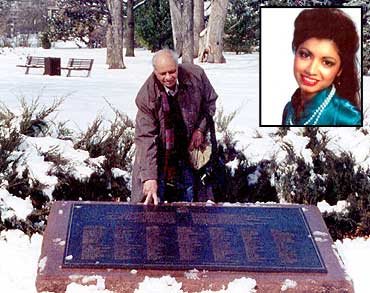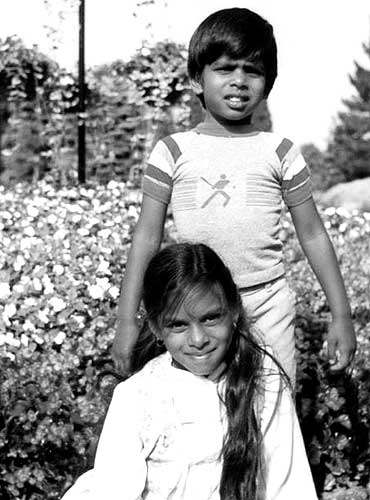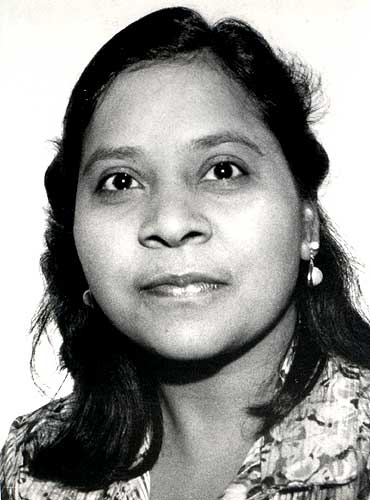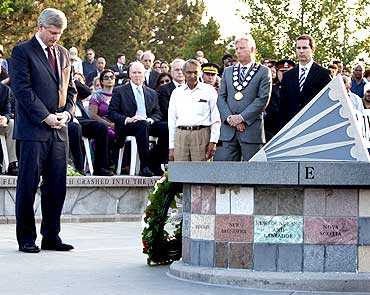After 25 long years of the Kanishka bombing in Canada in which 329 people on board the Air India flight 182 lost their lives, Chief Commissioner of the inquiry Justice John Major, recently said in his scathing report released earlier this month, that 'for too long the greatest loss of Canadian lives at the hands of terrorists has been somehow relegated outside the Canadian consciousness.'
Soon followed Canadian Prime Minister Stephen Harper's emotional apology on the eve of the tragedy's 25th anniversary, in which he stated, "I offer an apology for the institutional failing of 25 years ago and the treatment of the victims' families thereafter."
Rediff.com's Ajit Jain brings forth the anguished stories of some of the inconsolable victims of the deadly incident, as they try to come into terms with the new developments.
For 25 years, Ratan Singh Kalsi has carried his daughter's picture in his pocket. Indira, 21, was enrolled in nursing studies at the University of Guelph, Ontarion, Canada, when she became one of the victims of the Air India bombing in 1985.
Indira was going to New Delhi for the first time, said Kalsi. She had been working part time as a pharmacy assistant to save money. "She wanted to see my mother. Her dream remained unfulfilled, as did my mother's desire to see her granddaughter for the first time My mother, who was then 78, passed away in June 1985 as a result of the shock."
 |
"Children shouldn't die in front of their parents," he told India Abroad after Justice John Major's report was released. "I support his recommendations, especially with regard to aviation security. The report is good for the next generation. It won't affect us, as our loss is loss. My daughter will never come back. My pain is the same."
In his testimony before Justice Major, Kalsi said Indira hoped that 'she would one day dispense free medication to underprivileged people in India Her kindness in giving time and gifts extended beyond her family. She visited senior citizens' residences She also helped older people who lived on their own cleaned their houses, brought them flowers, and arranged for cakes on their birthdays.'
"This whole thing was done by Sikh terrorists, by the Babbar Khalsa," Kalsi said. "I am not afraid of them. They should come after me. They should kill me, as without my daughter, life is not worth living."
Kalsi attended the Air India bombing memorial service in Toronto on June 23, where Canadian Prime Minister Stephen Harper offered his apology.
Click NEXT to read the story of the man whose family was wiped off in the deadly incident..
Text: Ajit Jain in Toronto
'What has happened can't be reversed'
Image: File picture of Jyothi and Thejus Radhakrishna, who along with their mother, were killed in the bombingDr Haran Radhakrishna, who lost his wife Nagasundara, 42, and children Jyothi, 14, and Thejus, 8, in the Air India bombing, says he can't forget the family he lost.
Jyothi 'had a growing interest in humanitarian work,' he told the Commissioner of Justice John Major. 'She wanted to help people in distress. She had attended her graduation ceremony from Grade 8 the night prior to the flight she had some kind of a spiritual insight and she was a rare child She was a pacifist and often intervened in the conflicts in her friends' circle.'
Thejus, he said, 'was a bright, friendly and precocious child, with few inhibitions.'
"Any event that takes place, any public announcement that takes place, and on the anniversary day, the memory comes back," he said. "It is irreversible change. My children were going to India with my wife and I was to join them next month."
Radhakrishna didn't go to Ottawa on June 17 for the release of the Air India report by Justice John Major. "Most of the recommendations he has made are on the lines of what family members have been demanding for years. His recommendations seem to be strong."
But like others, he is waiting to see which recommendations the Canadian government implements.
Radhakrishna said Prime Minister Stephen Harper's apology was "overdue."
"Such a public apology at least creates awareness for those who still do not know that this was a Canadian tragedy and they were Canadian terrorists (who bombed the plane)," he added.
"Most of us were frustrated at every direction we turned and that's what John Major has said in his report We were let down at every level, so the prime minister's apology makes sense. It is appreciated."
"We are individually doing different things to cope with the loss," Radhakrishna said. "I am doing more on philosophical terms. What has happened can't be reversed. Whatever life is left with us we are trying to add some value to it."
He has involved himself with helping children in Toronto and India.
Click NEXT to read the story of man who played a leading role in providing justice to the Kanishka victims' kin..
'Many victims' kin did not live to see that we succeeded'
Image: File picture of Mrs Ramwati GuptaDr Bal Gupta, who lost his wife Ramwati in the Air India bombing, thanked prime minister Stephen Harper for instituting a public inquiry into the tragedy and apologizing to the victims' families for the way they were treated for all these years.
Gupta, who has played a leading role in the fight of the victims' kin to get justice, spoke on their behalf at the Air India memorial service in Toronto, after Harper made the apology.
Gupta told India Abroad that his feelings for Major's report were 'bittersweet, as 20 years is too late. Many friends who struggled with me have passed away. They did not live to see that we succeeded in having the inquiry instituted and that most of the recommendations that Justice Major made were on the lines of what we demanded in our submissions to the commission.'
..
'I understand Air India was the first file Harper asked for'
Image: Canadian PM Stephen Harper paying homage at the Kanishka victims' memorialPhotographs: Canadian PM's Office
He said the victims included 86 children; 29 families were completely wiped out -- both spouses and all children killed; 32 persons were left alone -- their spouse and all children were killed; six couples lost all their children; two children lost both parents.
"Air India 182 families thank Harper for establishing the commission of inquiry," he added. "The families thank Justice John Major and the commission staff for a thorough and comprehensive report, and the families' counsel for their hard work."
Gupta praised Harper for keeping his 2006 election promise. "I understand Air India was the first file Harper asked for and soon ordered the public enquiry," he said.
"I thanked him for that when we met him on behalf of the families on June 17. We also thank Justice Major for doing some very hard work despite all the obstructions put by the department of justice. Without mincing words, he castigated the authorities for treating us the way they treated us We are very satisfied with the inquiry."





article